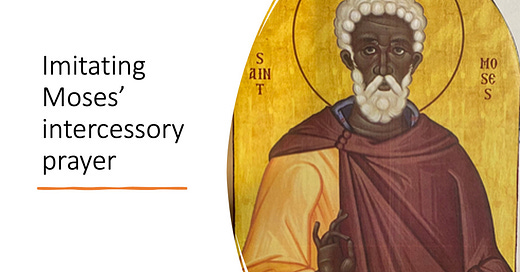Imitating Moses’ intercessory prayer
Psalm 106:19-23. March 23, 2023 - Thursday, 4th Week of Lent
Psalm 106 meditates on the history of Israel marked by Israel’s unfaithfulness. The sin that we hear today about was the making of the golden calf on Horeb (Mount Sinai) and worshipping it. Let’s recall briefly that story recorded in Exodus 32.
Moses was at the top of Mount Sinai alone talking with God and receiving from God “the two tablets of the testimony, tablets of stone, written with the finger of God” (Exodus 31:18). On the other hand, the entire population of Israel was at the foot of the mountain and got impatient waiting for Moses. So, they asked Aaron, the elder brother of Moses to make gods for them who would go before them (Ex 32:1). Surprisingly, Aaron agreed. The people gave him golden rings and earrings and he turn all the gold into a calf. Seeing the golden calf the people exclaimed: “These are your gods, O Israel, who brought you up out of the land of Egypt!” (Ex 32:4). Then Aaron built an altar, announced a feast day for the following day, and the next day people brought offerings and celebrated the feast eating, drinking and playing.
Moses did not know what was going on at the foot of the mountain but the Lord knew and was furious. As the psalmist says he was about to exterminate the entire population and begin everything anew with Moses. The promise given to Abraham, “I will make of you a great nation” (Gen 12:2), was offered to Moses: the Lord would make of Moses a great nation (Ex 32:12). Thus, it would be like in the times of Noah when the Lord sent the flood upon the sinful humanity and began everything again with Noah. But Moses did not let the Lord do that.
The way Moses turns the destructive wrath of God into mercy is a masterpiece. Exterminating his people would damage God’s reputation. If the Egyptians heard about it, they would say: “With evil intent did he bring them out, to kill them in the mountains and to consume them from the face of the earth’” (see Ex 32:12). Moreover, by destroying his people the Lord would break his oath given to Abraham about establishing an everlasting covenant with Abraham and his offspring after him “throughout their generations” (see Gen 17:7).
Our Catechism makes the following comment regarding that successful intercessory prayer of Moses: “God is love; he is, therefore, righteous and faithful; he cannot contradict himself; he must remember his marvellous deeds, since his glory is at stake, and he cannot forsake this people that bears his name” (CCC, 2577).
Moses’ prayer should become an inspiration for all of us. We are not better than the Israelites. We are also sinners. As Christ’s disciples, we have failed Him many times by not living up to the standards of the Gospel. Many of us also worship other lords besides Christ the Lord. But, instead of dividing the Church or attempting to start a new church, we should intercede for our Catholic Church. We should pray that the Lord will show us his mercy and turns us, sinners, into saints.




